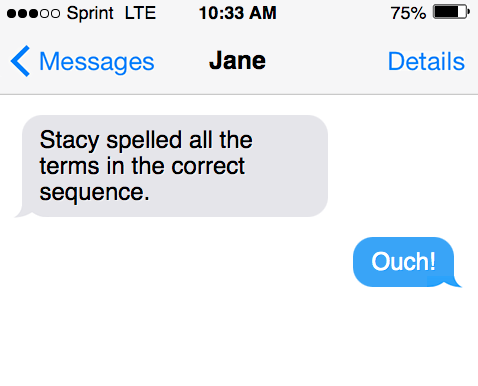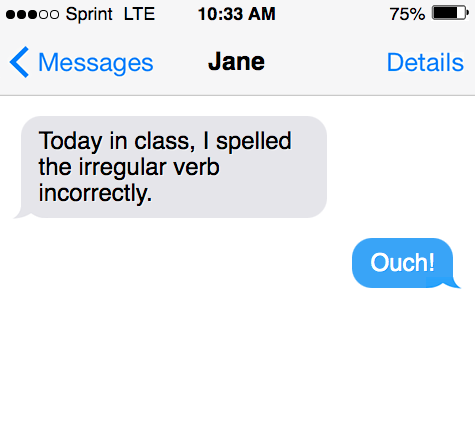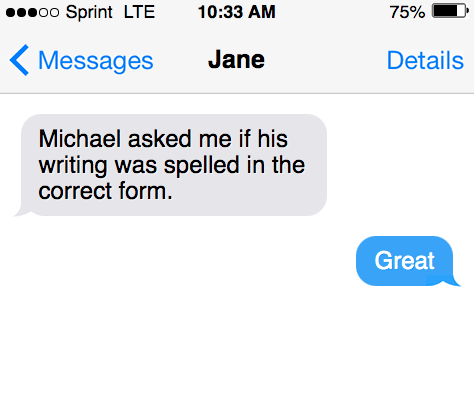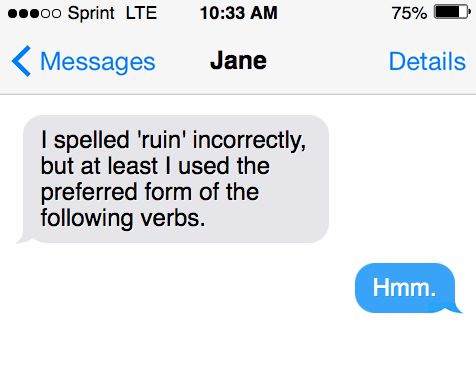Is the correct form spelled or spelt? Is it spelt “spelled,” or what is the right way to use and spell the word?
Although the letters are a little different, is there anything distinguishing spelled or spelt?
If you want to become a better writer, understanding the difference between spelt/spelled is crucial (and there are subtle differences between spelt/spelled).
In this article, you can learn the distinguishing factors between present and past tense versions of terms like “smell,” “smelt,” “spell,” “spelled,” and “spelt.”

Spelled: American English past tense
The word “spelled’ is the past tense of the verb “spell” in its regular form.
With that, “spell” carries several different definitions because it is a verb with both irregular and regular forms.
But you only use “spelled” as the word’s past tense and past participle form.
Also, keep in mind that this is the definition of “spelled” in the English language.
Depending on where you live, “spelled” may not be the simple past version of “spell.”
Still, “spelled” is the past participle of “spell.”
Spelt: an irregular verb
Irregular verbs are any verbs that do not add “-ed” or “-d” to its past tense form.
Some other examples include “smelt/smelled,” “go/went,” “dreamt/dreamed,” and “burnt/burned.”
Irregular verbs are sometimes called “strong verbs.”
Their irregular form makes learning how to write in English particularly difficult.
What is a past participle?
A past participle is the form of a verb that is used to form perfect and passive tenses.
Typically, a past participle will end in “-ed” in the American English dialect.
Also, a past participle will sometimes be used as an adjective.
Take the following sentence, for example:
“Immediately after the presentation, many hands were raised.”
In the previous example, “raised” is the past participle of “raise.”
Spell definition: form words letter
“Spell” means several different things.
Still, the word commonly means “to name the letters of in order.”
Or, “spell” can be defined as “to write or print the letters of in a particular way.”
According to these definitions, here is an example statement using the term:
“The graph shows how to spell the names of all the countries the business operates in.”
“Spell” can also mean “to add up to,” “to come to understand,” or “to read slowly and with great difficulty.”

Spelt means what in British English?
In British English and Australian English, “spelt” is the preferred spelling for the past tense version of “spell.”
Still, British English allows people to use spelt or spelled interchangeably.
Overall, using “spelt” in British English is not seen as a spelling mistake.
Spelt: American English meaning
In American English, “spelt” has a completely different meaning than the U.K. definition.
For example, “spelt” is a noun defined as ancient hardy wheat grown with long spikelets containing two light red flattened grains.
Additionally, the grain of spelt can be referred to as “farro.”
Further, this wheat is cooked in liquid and used in a number of dishes, like soups or salads.
As you can see, it’s important to know what the two forms of spelled and spelt are referring to.
The etymology of “spell” and “spelt”
The verb “spell” comes from the Middle English term “spellen” and the Old French term “espeller.”
Both archaic terms are derived from the Germanic root “spel-,” meaning “to say aloud” or “to recite.”
The Old French word “espeller” also evolved to mean “to signify, interpret.
As Americans permanently settled in the present-day United States, people combined the two words and their definitions to create several phrases.
Eventually, by the 1940s, “spell out” was defined as “to explain thoroughly,” a definition that is still used today.
People assume that “spelled” has always carried the same definition.
However, the American influence on certain verbs, such as “spelled,” evolved over hundreds of years.

When to use “spelled”
You used “spelled” to when referring to the past tense version of “spell.”
With that, the words spelled and spelt are often debated.
But in America, “spelled” is more commonly accepted in writing conventions.
So, when writing anything in the academic field, the correct spelling is “spelled.”
When to use “spelt”
“Spelt” is also used as the past tense and past participle word for “spell.”
However, the difference is that the verb is more often used in Great Britain and other countries.
Americans demand that “spelled” is typically used in writing instead of “spelt.”
But writing conventions in other countries allow “spelt” to be used.
Examples of how to use “spelled”
Here are some ways to use “spelled” in a sentence in American English.
- “Stacy spelled all the terms in the correct sequence.”
- “Today in class, I spelled the irregular verb incorrectly.”
- “Michael asked me if his writing was spelled in the correct form.”
- “I spelled ‘ruin’ incorrectly, but at least I used the preferred form of the following verbs.”
Examples of how to use “spelt”
Remember, in America, “spelled” is the word to use as the past simple tense of “spell.”
However, in other countries, like Great Britain, using the word “spelt” is an acceptable way to refer to the past tense of “spell.”
Also, the second form of “spelt” serves as a noun.
Here are some examples of how to use “spelt” in a sentence.
“He usually spelt words incorrectly, but today, he did much better.”
“JoAnn asked how ‘reference’ was spelt.”
“She wasn’t sure how her favorite band name was spelt so she asked her best friend.”

Is “spelled” or “spelt” more popular?
Based on historical Google books searches, “spelled” is more commonly used.
This statistic refers to the spelling or the term in the 20th century.
In comparison, “spelt” is steadily decreasing in the English-speaking world.
In UK writing conventions, “spelt” has been the preferred choice of the term.
Still, UK writing conventions show a steady increase in the version “spelled,” showing the American influence spreading into other languages.
Is “spelt” a misspelling?
In most contexts, Americans demand that “spelt” be considered an incorrect spelling of “spelled.”
So, yes, in the American English language “spelt” is a spelling mistake.
However, British English allows you to use both spelled and spelt, and it will still be the correct usage.
How to remember which word to use: spelled or spelt
It can be tricky to know the exact difference of spelled vs spelt.
An easy way to distinguish this difference and temporarily relieve your stress is to always use “spelled” when talking about the past simple tense of “spell.”
In British English, “spelt” primarily refers to the same thing as “spelled,” but “spelled” is becoming more commonly used.
Essentially, if you do not live in America, both action terms “spelt” and “spelled” are acceptable.
In American English, you can write “spelt” to refer to a noun, ancient wheat, as well.
Examples of other action words with regular and irregular forms
There’s a minor point distinction between spelled or spelt.
The same applies to other action terms.
For example, the “smelt” spell is typically a British spelling, while “smelled” is American.
Other terms, like “burn,” “burned,” “burnt,” “dream,” “dreamed,” and “dreamt,” are all acceptable spellings.
Sources
- Spell Definition – Merriam-Webster
- Definitions for past participle – Merriam-Webster
- Spelt Definition – Merriam-Webster
- What Is an Irregular Verb? – Your Dictionary
- Proper Spelling of Spelled vs. Spelt – Grammarist
- Spelt Spelled – Which Is Correct? – Grammarly
- Spelt or spelled? – The Word Counter
- Is ‘burnt’ acceptable as the past tense of ‘burn’? – Merriam-Webster
- Spelt or Spelled: What’s the Difference? – Writing Explained
- spellen – Wiktionary
- espeller – Wiktionary
- What Is Farro? – The Spruce Eats
Inside this article
Fact checked:
Content is rigorously reviewed by a team of qualified and experienced fact checkers. Fact checkers review articles for factual accuracy, relevance, and timeliness. Learn more.
Core lessons
Glossary
- Abstract Noun
- Accusative Case
- Anecdote
- Antonym
- Active Sentence
- Adverb
- Adjective
- Allegory
- Alliteration
- Adjective Clause
- Adjective Phrase
- Ampersand
- Anastrophe
- Adverbial Clause
- Appositive Phrase
- Clause
- Compound Adjective
- Complex Sentence
- Compound Words
- Compound Predicate
- Common Noun
- Comparative Adjective
- Comparative and Superlative
- Compound Noun
- Compound Subject
- Compound Sentence
- Copular Verb
- Collective Noun
- Colloquialism
- Conciseness
- Consonance
- Conditional
- Concrete Noun
- Conjunction
- Conjugation
- Conditional Sentence
- Comma Splice
- Correlative Conjunction
- Coordinating Conjunction
- Coordinate Adjective
- Cumulative Adjective
- Dative Case
- Determiner
- Declarative Sentence
- Declarative Statement
- Direct Object Pronoun
- Direct Object
- Diction
- Diphthong
- Dangling Modifier
- Demonstrative Pronoun
- Demonstrative Adjective
- Direct Characterization
- Definite Article
- Doublespeak
- False Dilemma Fallacy
- Future Perfect Progressive
- Future Simple
- Future Perfect Continuous
- Future Perfect
- First Conditional
- Irregular Adjective
- Irregular Verb
- Imperative Sentence
- Indefinite Article
- Intransitive Verb
- Introductory Phrase
- Indefinite Pronoun
- Indirect Characterization
- Interrogative Sentence
- Intensive Pronoun
- Inanimate Object
- Indefinite Tense
- Infinitive Phrase
- Interjection
- Intensifier
- Infinitive
- Indicative Mood
- Participle
- Parallelism
- Prepositional Phrase
- Past Simple Tense
- Past Continuous Tense
- Past Perfect Tense
- Past Progressive Tense
- Present Simple Tense
- Present Perfect Tense
- Personal Pronoun
- Personification
- Persuasive Writing
- Parallel Structure
- Phrasal Verb
- Predicate Adjective
- Predicate Nominative
- Phonetic Language
- Plural Noun
- Punctuation
- Punctuation Marks
- Preposition
- Preposition of Place
- Parts of Speech
- Possessive Adjective
- Possessive Determiner
- Possessive Case
- Possessive Noun
- Proper Adjective
- Proper Noun
- Present Participle
- Prefix
- Predicate



